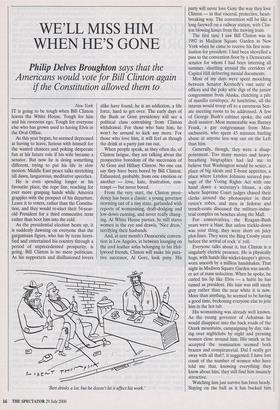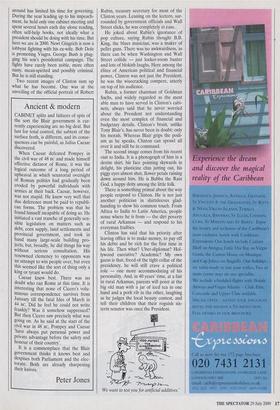WE'LL MISS HIM WHEN HE'S GONE
Philip Delves Broughton says that the
Americans would vote for Bill Clinton again if the Constitution allowed them to
New York IT is going to be tough when Bill Clinton leaves the White House. Tough for him and his ravenous ego. Tough for everyone else who has grown used to having Elvis in the Oval Office.
As this year began, he seemed depressed at having to leave, furious with himself for the wasted chances and poking desperate fun at his future role if his wife became a senator. But now he is doing something different, trying to put his life in slow motion: Middle East peace talks stretching till dawn, languorous, meditative speeches.
He is even spending longer at his favourite place, the rope line, reaching for ever more grasping hands while America grapples with the prospect of his departure. Leave it to voters, rather than the Constitu- tion, and they would re-elect their 54-year- old President for a third consecutive term rather than boot him into the cold.
As the presidential election heats up, it is suddenly dawning on everyone that the gargantuan figure, who has by turns horri- fied and entertained his country through a period of unprecedented prosperity, is going. Bill Clinton is no mere politician. As his supporters and disillusioned lovers alike have found, he is an addiction, a life force, hard to get over. The early days of the Bush or Gore presidency will see a political class convulsing from Clinton withdrawal. For those who hate him, he won't be around to kick any more. For those who love him, it will feel as though the drink at a party just ran out.
When people speak, as they often do, of Clinton fatigue, they are talking about the prospective boredom of the succession of Al Gore and Hillary Clinton. No one can say they have been bored by Bill Clinton. Exhausted, probably, from one emotion or another — love, hate, frustration, con- tempt — but never bored.
From the very start, the Clinton presi- dency has been a classic: a young governor storming out of a tiny state, garlanded with reports of womanising, draft-dodging and low-down cunning, and never really chang- ing. At White House parties, he still stares women in the eye and drawls, 'Nice dress,' terrifying their husbands.
And, at next month's Democratic conven- tion in Los Angeles, in between lounging on the cool leather sofas belonging to his Hol- lywood friends, Clinton will make his puta- tive successor, Al Gore, look puny. His Bert drinks a lot, but he doesn't let it affect his work' party will never love Gore the way they love Clinton — in that visceral, protective, heart- breaking way. The convention will be like a long farewell on a railway station, with Clin- ton blowing kisses from the moving train.
The first time I saw Bill Clinton was in 1992 in Madison Square Garden in New York when he came to receive his first nom- ination for president. I had been shovelled a pass to the convention floor by a Democratic senator for whom I had been interning all summer, shuttling around the corridors of Capitol Hill delivering menial documents.
Most of my days were spent mooching between Senator Kennedy's vast suite of offices and the poky attic digs of the junior congressman from Alaska, clutching a pile of manilla envelopes. At lunchtime, all the interns would troop off to a cavernous Sen- ate meeting room to be addressed. A few of George Bush's cabinet spoke, the odd droll senator. Most memorable was Barney Frank, a gay congressman from Mas- sachusetts, who spent 45 minutes hurling abuse at anyone less way out on the Left than him.
Generally, though, they were a disap- pointment. Too many movies and heavy- breathing biographies had led me to believe that Washington would be sexier, a place of big ideals and T-bone appetites, a place where Lyndon Johnson secured pas- sage of the Voting Rights Act with one hand down a secretary's blouse, a city where Supreme Court judges chased their clerks around the photocopier in their raven's robes, and men in fedoras and trench-coats discussed the military-indus- trial complex on benches along the Mall.
For conservatives, the Reagan-Bush years were a blast. But unless trickle-down was your thing, they were short on juicy plot-lines. They were the Bing Crosby years before the arrival of rock 'n' roll.
Everyone talks about it, but Clinton is a singularly electric presence. He is physically huge, with hands like wicket-keeper's gloves, worn smooth by a million handshakes. That night in Madison Square Garden was anoth- er act of mass seduction. When he spoke, he curled his lip like Elvis — a habit he has tamed as president. His hair was still steely grey rather than the near white it is now. More than anything, he seemed to be having a good time, beckoning everyone else to join him in the hot tub.
His womanising was already well known. As the young governor of Arkansas he would disappear into the back roads of the Ozark mountains, campaigning by day, tak- ing over nightclubs by night and pressing women close around him. His smirk as he accepted the nomination seemed both brazen and conspiratorial. Did I really get away with all that?, it suggested. I have lost count of the number of women who have told me that, knowing everything they know about him; they still find him insanely attractive.
Watching him just survive has been heady. Staying on the bull as it has bucked him around has limited his time for governing. During the year leading up to his impeach- ment, he held only one cabinet meeting and spent several hours each day alone reading, often self-help books, not ideally what a president should be doing with his time. But here we are in 2000. Newt Gingrich is now a lobbyist fighting with his ex-wife. Bob Dole is promoting Viagra. George Bush is plug- ging his son's presidential campaign. The fights have rarely been noble, more often nasty, mean-spirited and possibly criminal. But he is still standing.
Two recent images of Clinton sum up what he has become. One was at the unveiling of the official portrait of Robert Rubin, treasury secretary for most of the Clinton years. Leaning on the lectern, sur- rounded by government officials and Wall Street slicks, he was completely at ease.
He joked about Rubin's ignorance of pop culture, saying Rubin thought B.B. King, the blues musician, was a maker of pellet guns. There was no awkwardness, as there can be when Washington and Wall Street collide — just locker-room banter and lots of blokish laughs. Here among the elites of American political and financial power, Clinton was not just the President; he was the wisecracking compere, utterly on top of his audience.
Rubin, a former chairman of Goldman Sachs, and widely regarded as the most able man to have served in Clinton's cabi- nets, always said that he never worried about the President not understanding even the most complex of financial and budgetary details. Clinton's brain, unlike Tony Blair's, has never been in doubt; only his morals. Whereas Blair grips the podi- um as he speaks, Clinton can sprawl all over it and still be in command.
The second image comes from his recent visit to India. It is a photograph of him in a denim shirt, his face pointing skywards in delight, his plasticine chin jutting out, his piggy eyes almost shut, flower petals raining down around him. He is Bubba the Rain God, a happy deity among the little folk.
There is something primal about the way people respond to Clinton. He is not just another politician in shirtsleeves glad- handing to show his common touch. From Africa to India to Latin America, people sense where he is from — the dirt poverty of rural Arkansas — and respond to his everyman frailties.
Clinton has said that his priority after leaving office is to make money, to pay off his debts and be rich for the first time in his life. Then what? Uber-diplomat? Hol- lywood executive? Academic? My own guess is that, freed of the tight collar of the presidency, he will still crave a political role — one more accommodating of his personality. And, in 40 years' time, at a fair in rural Arkansas, parents will point at the big old man with a jar of iced tea in one hand and a pork rib in the other, laughing as he judges the local beauty contest, and tell their children that their roguish six- term senator was once the President.
We want to test you for artificial additives.'



























































 Previous page
Previous page